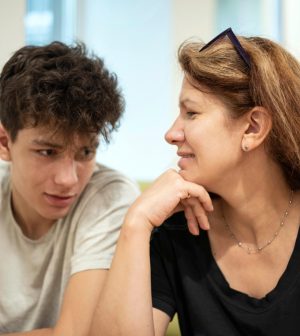- Could Artificial Sweeteners Be Aging the Brain Faster?
- Techniques for Soothing Your Nervous System
- Does the Water in Your House Smell Funny? Here’s Why
- Can a Daily Dose of Apple Cider Vinegar Actually Aid Weight Loss?
- 6 Health Beverages That Can Actually Spike Your Blood Sugar
- Treatment Options for Social Anxiety Disorder
- Understanding the Connection Between Anxiety and Depression
- How Daily Prunes Can Influence Cholesterol and Inflammation
- When to Take B12 for Better Absorption and Energy
- Epsom Salts: Health Benefits and Uses
When Is the Right Time to Tell a Child They Have Autism?

Bella Kofner, a 24-year-old graduate student in special education at the College of Staten Island in New York, was 10 when her parents first told her she had autism. Developmental psychologist Steven Kapp, now 35, was 13 when he was told the same.
So, is there a best time to tell children they have the developmental disorder? New research suggests that younger is better.
Kofner, Kapp and their colleagues answered that question by asking 78 university students about how and when they found out they had autism. For the most part, the investigators found that telling kids when they are younger helped them feel better about their lives as they grew up.
“Talking openly with autistic people about being autistic when they are young may help them grow into adults who feel happier and more comfortable with who they are than they might become if they don’t learn this key information about who they are until later in life,” said lead study author Kristen Gillespie-Lynch, an assistant professor of psychology at the College of Staten Island.
“Learning that one is autistic at a younger age can aid better self-understanding as well as access to support, which in turn lays a foundation for well-being as an adult,” added study author Tomisin Oredipe, a graduate student at the College of Staten Island. The new study, which was published recently in the journal Autism, is based on Oredipe’s thesis paper.
It’s not just age that matters though, Oredipe said. Other factors include your child’s developmental level, curiosity, support needs and personality.
Sooner better than later
“Almost more important than when an autism diagnosis is disclosed is how it is disclosed,” said Kapp, a lecturer in psychology at the University of Portsmouth in Hampshire, England. Make sure to talk about your child’s strengths as well as their challenges in a language they can understand, he said. “My mother said my brain worked differently, and I thought that was a good explanation,” recalled Kapp.
It doesn’t have to be a one-and-done conversation either. “Do it in pieces over time,” Kapp added.
The new findings mirror what Robert Naseef sees in his practice. He is a psychologist in Philadelphia and a member of the Autism Society of America’s panel of professional advisors.
“Some of the best-adjusted people in college and beyond knew about their autism all along, just like it was the color of their hair,” said Naseef, who was not involved in the new study.
The findings don’t necessarily apply to people with autism who are non-speaking or minimally verbal, he noted. “If they don’t have the vocabulary and the ability to understand, then we just help them grow as best we can,” said Naseef. His adult son is non-speaking.
How do you know the time is right? It may be time if and when your child starts asking questions like, “Why do I have a special speech teacher or a helper in school?”
Therapists, teachers can help
“Parents can say ‘you learn differently’ or ‘your brain is different’ and stress their child’s strengths as well as their challenges,” Naseef said.
Don’t miss this window. “If parents aren’t talking to their child somebody else might, and they would rather hear it from you versus on the playground,” he said.
Some parents feel most comfortable having the conversation at home and others want a psychologist or psychiatrist to be there, said Dr. Melissa Nishawala. She is the director of the Autism Spectrum Disorder Research and Clinical Program at Hassenfeld Children’s Hospital at NYU Langone Health in New York City.
“Parents don’t have to get it exactly right on the first try and don’t need to explain every detail,” said Nishawala, who had no ties to the research. “There will be many opportunities to revisit and clarify.”
Deciding when to share your child’s diagnosis with them is a very personal decision, said Lindsay Naeder, vice president of services and support and community impact for Autism Speaks.
“Your child may or may not seek more information and ask you questions after your initial discussion,” said Naeder. “All children, especially those with autism, need to hear certain information multiple times.”
Help them understand how you, their teachers and therapists all want to help them. “Don’t forget to remind them that everyone needs help sometimes,” she said.
It may comfort your child to hear that autism is common and that there are many children like them, Naeder added.
More information
The Autism Society has more information on available services and therapies for people with autism.
SOURCES: Bella Kofner, graduate student, College of Staten Island, New York City; Steven Kapp, developmental psychologist, lecturer, psychology, University of Portsmouth, Hampshire, England; Kristen Gillespie-Lynch, PhD, assistant professor, psychology, College of Staten Island, New York City; Tomisin Oredipe, graduate student, College of Staten Island, New York City; Robert Naseef, PhD, psychologist, member, Autism Society of America’s Panel of Professional Advisors, Philadelphia; Lindsay Naeder, vice president, services and support and community impact, Autism Speaks; Melissa Nishawala, MD, director, Autism Spectrum Disorder Research and Clinical Program, Hassenfeld Children’s Hospital, NYU Langone Health, New York City; Autism, April 11, 2022
Source: HealthDay
Copyright © 2026 HealthDay. All rights reserved.










